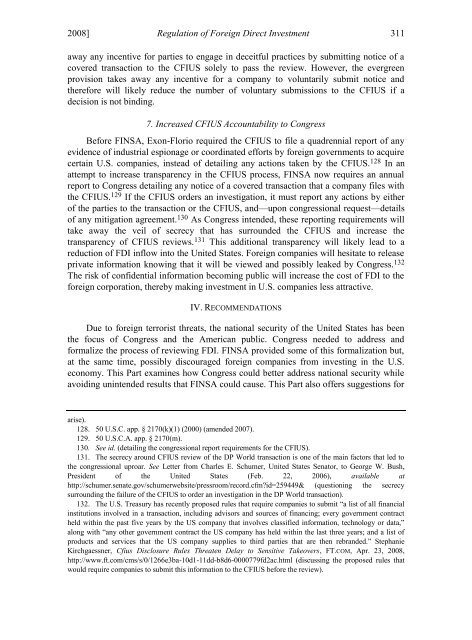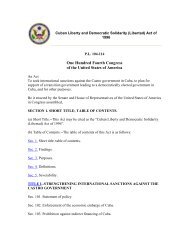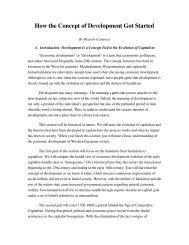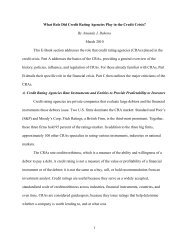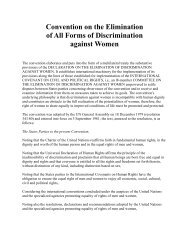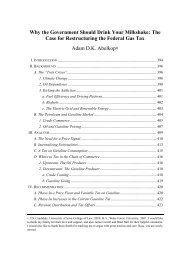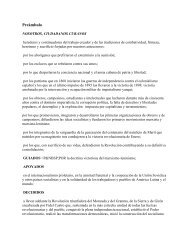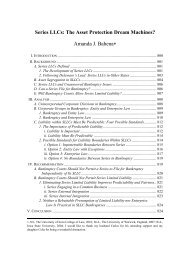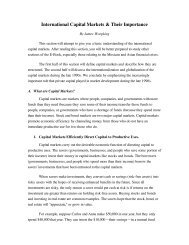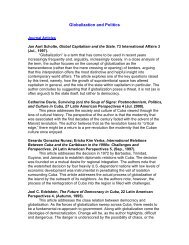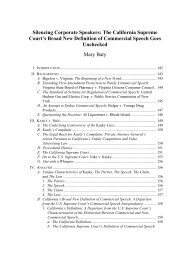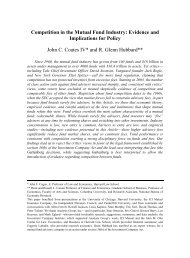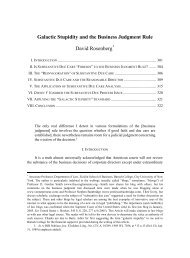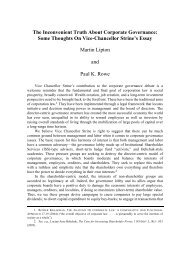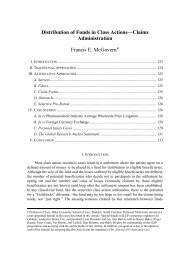Regulation of Foreign Direct Investment After the Dubai Ports ...
Regulation of Foreign Direct Investment After the Dubai Ports ...
Regulation of Foreign Direct Investment After the Dubai Ports ...
You also want an ePaper? Increase the reach of your titles
YUMPU automatically turns print PDFs into web optimized ePapers that Google loves.
2008] <strong>Regulation</strong> <strong>of</strong> <strong>Foreign</strong> <strong>Direct</strong> <strong>Investment</strong> 311<br />
away any incentive for parties to engage in deceitful practices by submitting notice <strong>of</strong> a<br />
covered transaction to <strong>the</strong> CFIUS solely to pass <strong>the</strong> review. However, <strong>the</strong> evergreen<br />
provision takes away any incentive for a company to voluntarily submit notice and<br />
<strong>the</strong>refore will likely reduce <strong>the</strong> number <strong>of</strong> voluntary submissions to <strong>the</strong> CFIUS if a<br />
decision is not binding.<br />
7. Increased CFIUS Accountability to Congress<br />
Before FINSA, Exon-Florio required <strong>the</strong> CFIUS to file a quadrennial report <strong>of</strong> any<br />
evidence <strong>of</strong> industrial espionage or coordinated efforts by foreign governments to acquire<br />
certain U.S. companies, instead <strong>of</strong> detailing any actions taken by <strong>the</strong> CFIUS. 128 In an<br />
attempt to increase transparency in <strong>the</strong> CFIUS process, FINSA now requires an annual<br />
report to Congress detailing any notice <strong>of</strong> a covered transaction that a company files with<br />
<strong>the</strong> CFIUS. 129 If <strong>the</strong> CFIUS orders an investigation, it must report any actions by ei<strong>the</strong>r<br />
<strong>of</strong> <strong>the</strong> parties to <strong>the</strong> transaction or <strong>the</strong> CFIUS, and—upon congressional request—details<br />
<strong>of</strong> any mitigation agreement. 130 As Congress intended, <strong>the</strong>se reporting requirements will<br />
take away <strong>the</strong> veil <strong>of</strong> secrecy that has surrounded <strong>the</strong> CFIUS and increase <strong>the</strong><br />
transparency <strong>of</strong> CFIUS reviews. 131 This additional transparency will likely lead to a<br />
reduction <strong>of</strong> FDI inflow into <strong>the</strong> United States. <strong>Foreign</strong> companies will hesitate to release<br />
private information knowing that it will be viewed and possibly leaked by Congress. 132<br />
The risk <strong>of</strong> confidential information becoming public will increase <strong>the</strong> cost <strong>of</strong> FDI to <strong>the</strong><br />
foreign corporation, <strong>the</strong>reby making investment in U.S. companies less attractive.<br />
IV. RECOMMENDATIONS<br />
Due to foreign terrorist threats, <strong>the</strong> national security <strong>of</strong> <strong>the</strong> United States has been<br />
<strong>the</strong> focus <strong>of</strong> Congress and <strong>the</strong> American public. Congress needed to address and<br />
formalize <strong>the</strong> process <strong>of</strong> reviewing FDI. FINSA provided some <strong>of</strong> this formalization but,<br />
at <strong>the</strong> same time, possibly discouraged foreign companies from investing in <strong>the</strong> U.S.<br />
economy. This Part examines how Congress could better address national security while<br />
avoiding unintended results that FINSA could cause. This Part also <strong>of</strong>fers suggestions for<br />
arise).<br />
128. 50 U.S.C. app. § 2170(k)(1) (2000) (amended 2007).<br />
129. 50 U.S.C.A. app. § 2170(m).<br />
130. See id. (detailing <strong>the</strong> congressional report requirements for <strong>the</strong> CFIUS).<br />
131. The secrecy around CFIUS review <strong>of</strong> <strong>the</strong> DP World transaction is one <strong>of</strong> <strong>the</strong> main factors that led to<br />
<strong>the</strong> congressional uproar. See Letter from Charles E. Schumer, United States Senator, to George W. Bush,<br />
President <strong>of</strong> <strong>the</strong> United States (Feb. 22, 2006), available at<br />
http://schumer.senate.gov/schumerwebsite/pressroom/record.cfm?id=259449& (questioning <strong>the</strong> secrecy<br />
surrounding <strong>the</strong> failure <strong>of</strong> <strong>the</strong> CFIUS to order an investigation in <strong>the</strong> DP World transaction).<br />
132. The U.S. Treasury has recently proposed rules that require companies to submit ―a list <strong>of</strong> all financial<br />
institutions involved in a transaction, including advisors and sources <strong>of</strong> financing; every government contract<br />
held within <strong>the</strong> past five years by <strong>the</strong> US company that involves classified information, technology or data,‖<br />
along with ―any o<strong>the</strong>r government contract <strong>the</strong> US company has held within <strong>the</strong> last three years; and a list <strong>of</strong><br />
products and services that <strong>the</strong> US company supplies to third parties that are <strong>the</strong>n rebranded.‖ Stephanie<br />
Kirchgaessner, Cfius Disclosure Rules Threaten Delay to Sensitive Takeovers, FT.COM, Apr. 23, 2008,<br />
http://www.ft.com/cms/s/0/1266e3ba-10d1-11dd-b8d6-0000779fd2ac.html (discussing <strong>the</strong> proposed rules that<br />
would require companies to submit this information to <strong>the</strong> CFIUS before <strong>the</strong> review).


